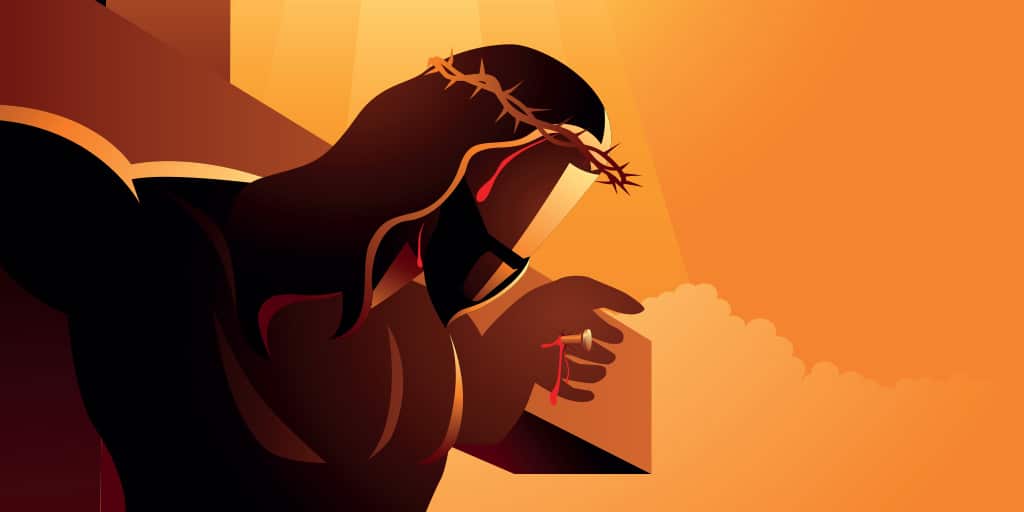Holy Week: Three Days and Three Nights in the Tomb

“Low in the grave He lay—Jesus my Savior!
Waiting the coming day—Jesus my Lord.”[1]
To all outward appearance, this is a tragic time. Jesus had been crucified. Once His death was confirmed, His body was taken down from the cross, and two of His followers, Joseph of Arimathea and Nicodemus, did a bare minimum job of preparing His body for burial. Matthew tells us that His body was anointed with about 75 pounds of spices, and He was wrapped in fine linen (Matthew 27:57-60; John 19:39-40). He was then laid in Joseph’s own tomb just in time before the Sabbath began.
Why the rush? Jews had very strict rules about what could and could not be done on the Sabbath. And doing a thorough job of preparing Jesus’ body would have taken too much time, and thus violated those rules. As you recall, throughout Jesus’ ministry He was constantly in conflict with the Jewish leaders because He was perceived to be breaking the Sabbath by working, eating, healing, and so forth.[2]
But let’s go back to Genesis to see where the Sabbath originated. We find this in Genesis 2:2-3: “By the seventh day God had finished the work he had been doing; so on the seventh day he rested from all his work. Then God blessed the seventh day and made it holy, because on it he rested from all the work of creating that he had done.”
That word “rested” is the Hebrew word sabat”—to rest; to come to an end; to stop; to cease. God had looked upon everything He had made and pronounced it “good.” There was no need for more work to be done; creation was complete, so God stopped. He rested.
However, as we know from reading the rest of the story, God’s good creation rebelled. Beginning with Adam and Eve in the Garden, we have chosen to go our own way rather than to follow the path lined out for us by our heavenly Father. “Therefore, just as sin entered the world through one man, and death through sin, and in this way death came to all people, because all sinned” (Romans 5:12).
Isaiah 53:6 explains, “We all, like sheep, have gone astray, each of us has turned to our own way; and the Lord has laid on him the iniquity of us all.”
Further, the psalmist David describes what happened to God’s good creation as a result:
“The fool says in his heart, ‘There is no God.’ They are corrupt, they do abominable deeds; there is none who does good. The Lord looks down from heaven on the children of man, to see if there are any who understand, who seek after God. They have all turned aside; together they have become corrupt; there is none who does good, not even one” (Psalm 14:1-3).
But God!
You see, death came to the human race because of Adam’s sin, but God did “not [want] anyone to perish, but everyone to come to repentance” (2 Peter 3:9). So, beginning as early as Genesis 3:15, God revealed His plan for us to come back into fellowship with Him. God would still demand death as the penalty for sin, but He would substitute His own Son, “the Lamb of God, who takes away the sin of the world” (John 1:29). Jesus would die in our place. Or, as Dr. Erwin Lutzer puts it, the gods of many religions demand a sacrifice, but only in Christianity does God Himself become the sacrifice!
God describes this for us in the very familiar passage from John 3:
“Just as Moses lifted up the snake in the wilderness,[3] so the Son of Man must be lifted up, that everyone who believes may have eternal life in him. For God so loved the world that he gave his one and only Son, that whoever believes in him shall not perish but have eternal life. For God did not send his Son into the world to condemn the world, but to save the world through him. Whoever believes in him is not condemned, but whoever does not believe stands condemned already because they have not believed in the name of God’s one and only Son.” (John 3:14-18)
When Jesus was on the cross, He took upon Himself all of our sin—past, present, and future. John explains that while Jesus hung on the cross, “knowing that everything had now been finished” (John 19:28), He said, “‘It is finished,’… bowed his head and gave up his spirit” (John 19:30).
With that background in mind, while reading an article recently, I was profoundly impacted by the statement, “Jesus’ body was in the tomb during the Sabbath.”[4] Bear in mind that God “rested” when He completed the work of creation. Now, having completed the work of redemption, Jesus rested.
Jesus rested in the tomb[5] because there was no more work to be done to accomplish our salvation. There was nothing more He needed to do to bring humankind back into a right relationship with our Creator. Because of what Jesus had already accomplished on the cross, “we have been sanctified through the offering of the body of Jesus Christ once for all” (Hebrews 10:10). To be sure, He asks us to reach out to accept His gift of salvation, to make it our own, but there is nothing more He needs to do.
But for now, for the Sabbath, His body lay at rest in the tomb, anticipating the coming day when He would be “declared to be the Son of God in power… by His resurrection from the dead” (Romans 1:4).
And the next day?
Up from the grave He arose, with a mighty triumph o’er His foes
He arose a Victor from the dark domain and He lives forever with His saints to reign.
He arose! He arose! Hallelujah! Christ arose![6]
Scripture tells us, “When Christ had offered for all time a single sacrifice for sins, he sat down at the right hand of God” (Hebrews 10:12). There He remains, making intercession for us, until “his enemies should be made a footstool for his feet.” We await that day with eagerness!
Go Deeper
- Iran, Israel and End Time Events – 2 DVD’s 3 Books – Package Offer
- The End of America? – Book
- Can We Still Believe in the Rapture? – Book
- Northern Storm Rising – Book
- Robert Lowry, Low in the Grave, Public Domain. ↑
- If you want to look into this further, you will find 39 categories of “works” that were prohibited by the Jews (according to their religious leaders) on the Sabbath here: https://www.ou.org/holidays/the_thirty_nine_categories_of_sabbath_work_prohibited_by_law/.↑
- You can read the background for this statement in Numbers 21. ↑
- Jews for Jesus, “Jesus’ Last Week Leading Up to Passover: A Day-by-Day Look,” https://jewsforjesus.org/learn/jesus-last-week-leading-up-to-passover-a-day-by-day-look ↑
- What about the “three days and three nights” mentioned in Matthew 12:40? Is this a contradiction or an error in the Bible? William MacDonald explains in the Believer’s Bible Commentary: “Just as Jonah was three days and three nights in the belly of the great fish, so our Lord predicted that He would be three days and three nights in the heart of the earth. This raises a problem. If, as generally believed, Jesus was buried on Friday afternoon and rose again on Sunday morning, how can it be said that He was three days and nights in the tomb? The answer is that, in Jewish reckoning, any part of a day and night counts as a complete period. “A day and a night make an onah, and a part of an onah is as the whole” (Jewish saying). (William MacDonald, Believer’s Bible Commentary, accessed through biblegateway.com) ↑
- Lowry, Low in the Grave. ↑








